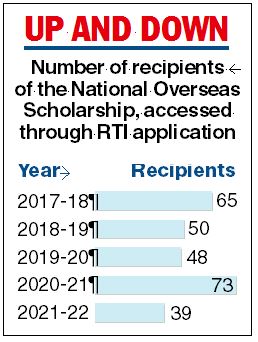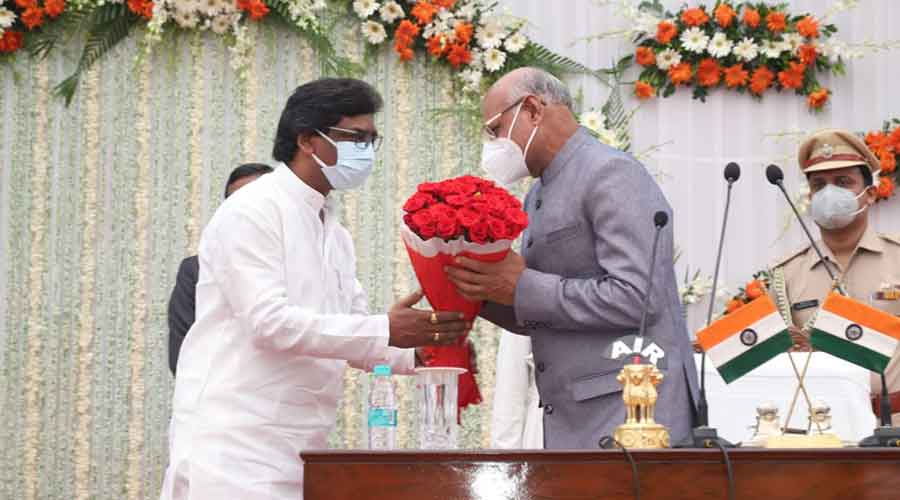An impoverished Dalit scholar has been running from pillar to post in vain for three years for a national scholarship that would enable him to study abroad despite multiple court orders in his favour over the past one year.
Aruna Mahananda, a first-generation learner from a below-poverty-line family at Gamhariguda village in Odisha’s Kalahandi region, had secured admission to the University of Essex in the UK for a PhD in “Criminal justice system in Odisha: An insight from released prisoners”.
He has been carrying out pre-research work since October, the institution having allowed him to pursue the four-year course online from India thus far as he is short of money. But Mahananda, 28, fears his registration could be cancelled any day as his first-year course fee of £15,000 (Rs 13.8 lakh) has not been paid despite the central government initially granting him provisional approval under the National Overseas Scholarship (NOS) scheme on Delhi High Court’s orders before rejecting his request altogether in May this year.
In February this year, the NOS scheme was revised to support 125 students, up from 100, but with the rider that those pursuing research on Indian culture, heritage, history and society would not be entertained under the plan. The move has come at a time caste and gender discrimination in India has attracted criticism abroad and triggered discussions in the West.
Mahananda said students seeking NOS had been facing bureaucratic hurdles for the past few years. A social justice and rights activist too said that Dalit scholars seeking scholarships to study abroad were often harassed on “trivial and flimsy” grounds.
The University of Essex had granted Mahanandaadmission on the assurance that he would get a scholarship. With the Union ministry of social justice and empowerment failing to award the scholarship to Mahananda, he has had to move Delhi High Court twice to remove the “bureaucratic obstacles”.The court gave a clear directive for the award of the scholarship last week but the ministry has been silent, Mahananda said. His parents are day labourers, his younger brother is an undergraduate student and his sister is a Class XII pupil. Mahananda completed his MA in social work in criminology and justice from the Tata Institute of Social Sciences (TISS) in 2018.
He has been trying to get a scholarship under the NOS, run by the social justice ministry, for the past three years so that he can go abroad for his PhD. Under the scheme, the government pays the tuition fee, maintenance charges for the stay abroad, and a one-time to-and-fro airfare.
In 2021, the government made it mandatory for a student applying under the NOS to have an unconditional offer letter from a foreign university. Before that, a student could apply for the scholarship with a conditional offer letter, bound to riders such as the eventual clearance of GRE/TOEFL and the procurement of financial support.

In 2019-20 and 2020-21, Mahananda’s applications were rejected by the ministry on the ground of a mismatch between the information provided in his application and that in the supporting documents he had submitted. He says there were no discrepancies.
He applied again in 2021-22 but was told that he did not have 60 per cent marks in MA, although he had a 6.8 Cumulative Grade Point Average, equivalent to 68 per cent marks. Mahananda petitioned Delhi High Court with the help of money given by friends.
The court directed the ministry to reconsider its rejection, after which Mahananda was issued a provisional award letter for the scholarship in October 2021. On the basis of this letter, the University of Essex confirmed his admission and allowed him to take part in classes online.
However, the ministry did not issue the final award letter, which is usually granted within two to three months of the provisional letter. On May 1 this year, the ministry rejected the provisional award by citing a clause in the NOS guidelines that states a student can visit India during his course abroad only in case of a family exigency, that too at their own expense. No maintenance allowances are to be granted for this period.
Mahananda’s course requires him to undertake a year’s fieldwork in Odisha. He said the University of Essex would not allow him to begin the second year of his course unless the dues from the first year were cleared, and that he would eventually have to travel abroad to complete a major portion of his PhD.
The ministry has contended that visits to India by the students for fieldwork cannot be allowed under the NOS.
Mahananda again approached the high court. The single-judge bench of Justice Yashwant Verma on August 31 said the government could not exclude fieldwork from the NOS.“Upon a careful consideration of that clause, the Court finds itself unable to sustain the view as expressed by the respondent (social justice ministry).… That clause which deals with such exigencies cannot be construed as excluding topics of study or research relating to India from the NOS,” the judgment said.
“It would be wholly arbitrary to deny the petitioner the benefits of the NOS merely because the research would also include a period during which the petitioner would have to spend time in the country for the collection of data and facts, interviewing people and assimilating material connected with that research,” it added.
The court quashed the ministry’s letter rejecting provisional award and directed it to issue a final award letter.Mahananda said he was still waiting for the final letter. “On August 31, I sent an email to the ministry requesting it to issue my award letter, without which my university will cancel my admission. But I have neither got my award letter nor any message,” Mahananda said. This newspaper sent an email to social justice ministry secretary Anjali Bhawra asking about the delay in the award of the scholarship and the allegation of bureaucratic hardship, but is yet to receive a response.
Anil Wagde, a social justice and rights activist, welcomed the court judgment and said Mahananda’s struggle would inspire more budding Dalit scholars to aspire to higher studies in foreign universities.“Dalit scholars are harassed on trivial and flimsy grounds (when they seek) overseas fellowships awarded by the Centre and the various states. But you have to keep up the fight, like Aruna has done,” Wagde said.
He criticised the provision under the NOS scheme that bars scholars from pursuing research abroad on topics related to Indian culture and society, saying it was yet another hurdle to prevent Dalit students from studying overseas. He demanded withdrawal of the provision.











